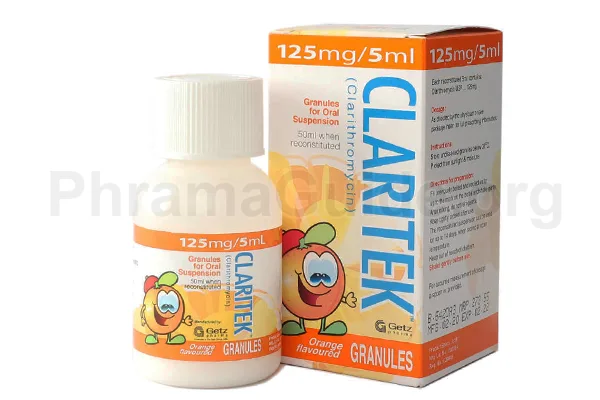Claritek syrup is a versatile antibiotic that targets a broad spectrum of bacteria. It is primarily used to treat bacterial infections including:
- Pharyngitis/Tonsillitis: Claritek syrup is commonly used to treat bacterial pharyngitis (sore throat) and tonsillitis in children caused by susceptible bacteria, especially in cases where a penicillin allergy is present or there is resistance to other commonly used antibiotics.
- Sinusitis: Claritek syrup is sometimes used in children to treat sinusitis, particularly when the infection is caused by bacteria that are susceptible to Claritek.
- Pneumonia: In cases of community-acquired pneumonia, Claritek syrup may be used to treat children when the responsible bacteria are susceptible to the medication.
- Skin and Soft Tissue Infections: Claritek syrup can be used to treat bacterial skin and soft tissue infections in children caused by susceptible organisms. This may include conditions such as cellulitis, impetigo, or infected wounds.
- Acute Otitis Media: Claritek syrup can be prescribed for the treatment of acute otitis media, which is a middle ear infection commonly seen in children. It helps to eradicate the bacteria causing the infection and alleviates symptoms such as ear pain and fever.
Off-label Uses of Claritek Syrup
- Atypical Respiratory Infections: Claritek syrup may be used off-label to treat atypical respiratory infections caused by bacteria such as Mycoplasma pneumoniae or Chlamydophila pneumoniae. These bacteria can cause respiratory tract infections, including pneumonia, in children.
- Pertussis (Whooping Cough): Claritek syrup may be used off-label as part of the treatment regimen for pertussis in children. Pertussis is a highly contagious bacterial infection that causes severe coughing fits.
- Lyme Disease: In some cases, Claritek syrup may be used off-label as part of combination therapy for the treatment of Lyme disease, which is caused by the bacteria Borrelia burgdorferi and transmitted by tick bites.
- Nontuberculous Mycobacterial Infections: Claritek syrup may be used off-label as part of combination therapy for the treatment of nontuberculous mycobacterial infections in children. These infections are caused by various species of mycobacteria and can affect different parts of the body, including the lungs and lymph nodes.

What is Claritek?
Claritek Syrup is one of the leading brands of Clarithromycin in oral liquid form, manufactured and marketed by Getz Pharmaceuticals (Pvt) Ltd, Pakistan.
Claritek Alternatives : Other Clarithromycin Brands
The following are some alternative brands of Claritek Syrup and their manufacturers.
- Klaricid : Abbott Laboratories (Pakistan) Ltd.
- E-Clar : Tabros Pharmaceuticals, Pakistan.
- Rithmo : Sami Pharmaceuticals, Pakistan.
- Klaribact : Merck (Pvt) Ltd.
- Maclacin : Bosch Pharmaceuticals, Pakistan
- Canter : Indus Pharmaceuticals, Pakistan.
- Clarion : Ferozsons Laboratories, Pakistan.
- Larith : Genix Pharmaceuticals, Pakistan.
- Megaklar : Barret Hodgson, Pakistan.
- Clacin : Werrick Pharmaceuticals, Pakistan.
Claritek : Available Formulations and Strengths
Presently, Claritek is Available in Syrup, Tablets, and Drops forms.
Claritek Syrup : 125mg/5ml and 250mg/5ml strengths.
Claritek Tablet : 250mg and 500mg strengths.
Claritek Drops : 125mg/5ml strength.
Who Should Not Use Claritek?
Claritek syrup has certain contraindications, which are situations where its use should be avoided due to potential risks or adverse effects.
Hypersensitivity: Claritek syrup should not be used in individuals who have a known hypersensitivity or allergic reaction to clarithromycin or any other macrolide antibiotics, such as azithromycin or erythromycin.
History of Cholestatic Jaundice or Hepatic Dysfunction: Claritek syrup is contraindicated in individuals who have a history of cholestatic jaundice (a type of liver disorder) or hepatic dysfunction (impaired liver function) associated with Claritek use.
Concomitant Use with Cisapride or Pimozide: Claritek syrup should not be used concurrently with cisapride or pimozide due to the risk of potentially serious cardiac arrhythmias.
Long QT Syndrome or Known QT Prolongation: Claritek syrup is contraindicated in individuals with a known history of Long QT syndrome (a heart rhythm disorder) or those taking medications known to prolong the QT interval, as Claritek may further increase the risk of abnormal heart rhythms.
Myasthenia Gravis: Claritek syrup should be used with caution in individuals with myasthenia gravis, a neuromuscular disorder, as macrolide antibiotics may exacerbate muscle weakness.
Severe Renal Impairment: Claritek syrup should be used with caution in individuals with severe renal impairment, as dose adjustments may be necessary.
Recommended Daily Dosage of Claritek Syrup
Claritek Syrup Dose for Children (6 months to 12 years old):
- 7.5 mg to 15 mg per kilogram of body weight per day, divided into two doses, taken 12 hours apart.
- The maximum daily dose should not exceed 500 mg.
For Example:
- A child who weighs 10 kg would need a daily dose of 75 mg. This could be given as a single dose of 75 mg or divided into two doses of 37.5 mg each.
- A child who weighs 20 kg would need a daily dose of 150 mg. This could be given as a single dose of 150 mg or divided into two doses of 75 mg each.
Claritek Syrup Dose for Adolescents (12 to 17 years old):
- 250 mg to 500 mg per day, divided into two doses, taken 12 hours apart.
- In certain infections, higher doses may be prescribed, such as up to 1,000 mg per day.
How Claritek Works?
Claritek binds to the 50S ribosomal subunit of bacteria, specifically to the 23S rRNA within the subunit. By binding to the 50S ribosomal subunit, Claritek interferes with the formation of peptide bonds between amino acids. This prevents the elongation of the growing peptide chain and inhibits bacterial protein synthesis, which eventually kills the bacteria.
Related Links:

Leave A Comment